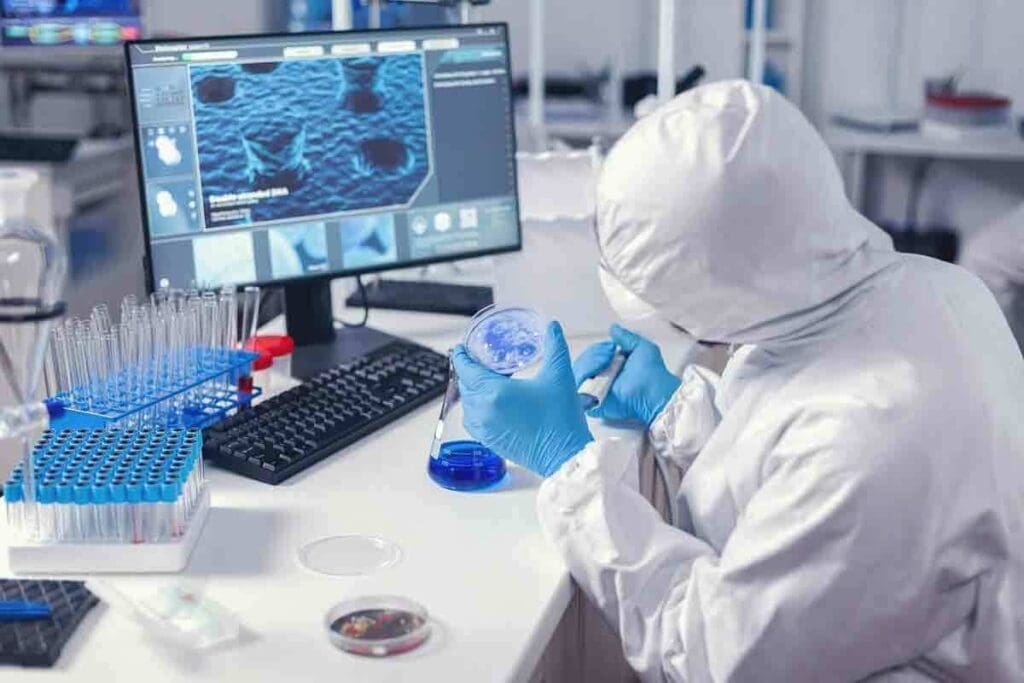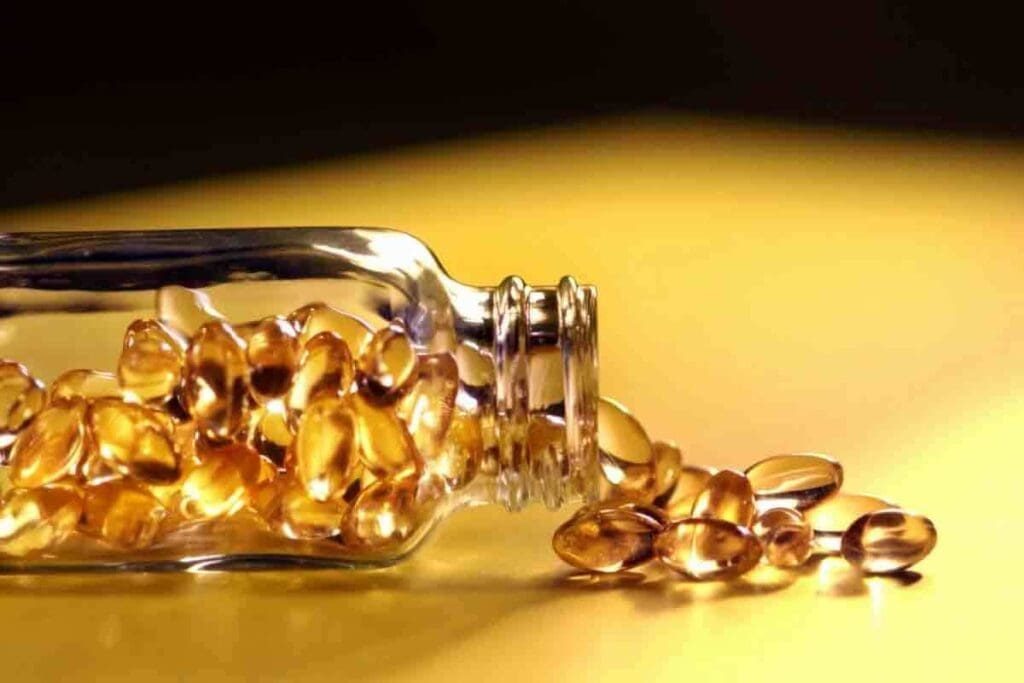Last Updated on November 17, 2025 by Ugurkan Demir

If you’re looking to define cobalamin, it refers to Vitamin B12 — a water-soluble vitamin essential for many vital body functions. Cobalamin plays a key role in DNA synthesis, red blood cell formation, and maintaining a healthy nervous system.
Vitamin B12 occurs naturally in certain foods, is added to others, and is also available as a supplement or prescription. Because it contains the mineral cobalt, it’s called cobalamin — a term used for all compounds with Vitamin B12 activity.
At LivHospital, we recognize how crucial cobalamin is for overall health. Our expert team provides advanced testing, treatment, and guidance to help patients maintain balanced Vitamin B12 levels and support long-term wellness.

Cobalamin, also known as Vitamin B12, is a key nutrient in our bodies. It has a cobalt atom at its center. This makes it important for many bodily functions.
The chemical structure of cobalamin is unique. It has a corrin ring that holds the cobalt atom. This setup helps cobalamin in many biochemical reactions.
These reactions include making DNA and breaking down fatty acids and amino acids. The properties of cobalamin, like its stability, come from its structure. There are different forms of cobalamin, each with its own role in the body.
The discovery of cobalamin helped solve pernicious anemia. This disease causes a lack of red blood cells. Before Vitamin B12 was found, pernicious anemia was often fatal.
Cobalamin’s historical significance goes beyond treating pernicious anemia. It has greatly helped us understand nutrition and diseases caused by nutrient deficiencies. Finding cobalamin was a big step forward in nutritional science.

Cobalamin is another name for Vitamin B12. It’s key for many body functions. We’ll look into what it is, why it matters, and its impact on health.
Cobalamin is just another word for Vitamin B12. Vitamin B12 is special because it has a metal ion, cobalt. This is important for its work. It helps make red blood cells, supports nerve health, and aids in DNA creation.
The term ‘cobalamin’ points to compounds with Vitamin B12 activity. Not all Vitamin B12 supplements or foods are easily used by our bodies.
The cobalamin family includes several important compounds. Methylcobalamin and 5-deoxyadenosylcobalamin are the active forms of Vitamin B12. Methylcobalamin helps with DNA and cell growth. 5-deoxyadenosylcobalamin is vital for energy in cells.
Knowing about the different cobalamin forms helps us understand Vitamin B12’s role in our bodies.
It’s key to know about the different types of cobalamin to understand its role in health. Cobalamin, or vitamin B12, is not just one thing. It’s a group of compounds that work together in our bodies.
There are four main types of cobalamin: Methylcobalamin, Adenosylcobalamin, Cyanocobalamin, and Hydroxocobalamin. Each has its own job in our bodies.
Methylcobalamin is a key form of vitamin B12 in us. It helps make methionine from homocysteine. This is important for DNA and keeping our nerves healthy.
Adenosylcobalamin is another active form of vitamin B12. It helps break down fatty acids and amino acids. This process helps make energy in our cells.
Cyanocobalamin is made in labs and found in supplements and fortified foods. Even though it’s not naturally made, our bodies can turn it into the active forms of vitamin B12.
Hydroxocobalamin is used in medicine for treating vitamin B12 deficiency and cyanide poisoning. It’s also given as an injection to people who can’t absorb vitamin B12 well.
Hydroxocobalamin and cyanocobalamin become active after being changed into methylcobalamin or adenosylcobalamin. This shows how our bodies can use different forms of cobalamin.
The various forms of cobalamin and their roles show how complex and vital vitamin B12 is for our health. Knowing about these forms helps us see why we need enough vitamin B12 and how it helps us stay healthy.
Cobalamin, also known as Vitamin B12, is vital for our bodies. It helps with DNA making, red blood cell creation, and brain health. It works as a helper for two key enzymes: methionine synthase and L-methylmalonyl-CoA mutase.
Cobalamin is key for making DNA, which is essential for cell growth and new cell creation. Methionine synthase, an enzyme that needs cobalamin, turns homocysteine into methionine. This methionine is used to make tetrahydrofolate, which is vital for DNA building blocks.
Without enough cobalamin, DNA making is affected. This can cause megaloblastic anemia, where red blood cells are large and not fully grown.
Cobalamin is also important for making red blood cells. It helps create the myelin sheath around nerve fibers and aids in fatty acid and amino acid metabolism. A lack of cobalamin can cause anemia, tiredness, and weakness because fewer red blood cells are made.
Cobalamin is vital for our nervous system. It helps make myelin, the fatty layer around nerve fibers, which speeds up nerve signal sending. Without enough cobalamin, we might feel numbness, have trouble walking, or notice changes in thinking.
This shows how important cobalamin is for our health. It’s essential to get enough through food or supplements.
Cobalamin is key for our body’s metabolic functions. It helps in breaking down fatty acids and amino acids. This cobalamin, or vitamin B12, is vital for many metabolic processes.
Cobalamin is needed for fatty acid and amino acid breakdown. It helps the enzyme L-methylmalonyl-CoA mutase work. This enzyme is key in turning L-methylmalonyl-CoA into succinyl-CoA, a step in energy production from fatty acids.
In fatty acid breakdown, cobalamin is essential. It helps the enzyme L-methylmalonyl-CoA mutase function. This enzyme is vital for converting L-methylmalonyl-CoA to succinyl-CoA, a step in energy production from fatty acids.
Cobalamin also plays a big role in amino acid metabolism. It helps in making methionine from homocysteine. This process is important for keeping healthy homocysteine levels in the blood.
In summary, cobalamin is vital for fatty acid and amino acid metabolism. It shows how important it is for our overall metabolic health.
The process of absorbing cobalamin is complex and involves several key components. Cobalamin, or vitamin B12, is essential for many bodily functions. These include DNA synthesis, red blood cell formation, and neurological function. For cobalamin to work, it must be absorbed by the body correctly.
The intrinsic factor mechanism is key to cobalamin absorption. When we eat cobalamin, it first binds to proteins in our food. In the stomach, pepsin and hydrochloric acid break it free from these proteins. Then, it binds with haptocorrin, a protein in saliva, forming a complex that is later broken down in the intestine.
After that, cobalamin binds to intrinsic factor, a protein made by the stomach. This complex is absorbed in the ileum, the last part of the small intestine. It uses specific receptors for this process.
Despite the detailed mechanism for absorbing cobalamin, several barriers can hinder it. These include:
Knowing about these barriers is important for diagnosing and treating cobalamin deficiency. The table below summarizes the main factors that affect cobalamin absorption.
| Factor | Description | Impact on Absorption |
| Dietary Restrictions | Lack of animal products in diet | Reduced cobalamin intake |
| Gastric Conditions | Atrophic gastritis, reduced intrinsic factor | Impaired cobalamin binding and absorption |
| Intestinal Diseases | Crohn’s disease, celiac disease | Disrupted absorption of intrinsic factor-cobalamin complex |
The process of cobalamin absorption is complex and can be influenced by various factors. Ensuring proper absorption is critical for maintaining adequate cobalamin levels and overall health.
“Cobalamin deficiency can lead to severe health issues, including megaloblastic anemia and neurological damage. Understanding the factors that influence its absorption is key to prevention and treatment.”
The amount of cobalamin we need changes with age and health. Knowing these amounts is key to getting enough nutrition and avoiding deficiency.
Our need for cobalamin changes as we grow. The Recommended Dietary Allowance (RDA) for vitamin B12 is as follows:
As we get older, our need for cobalamin goes up. Pregnant and lactating women need the most because of their babies’ needs.
Some groups need more cobalamin than others. For example, vegetarians and vegans might not get enough from their diet. They often need to eat fortified foods or take supplements.
Older adults might also need more cobalamin because their bodies absorb it less well. They can increase their intake through diet or supplements, with a doctor’s advice.
Some health issues can make it hard for the body to absorb cobalamin. This means these people might need to eat more. It’s important to talk to a doctor to figure out the right amount for you.
It’s important to know why cobalamin deficiency happens. Cobalamin, or vitamin B12, is key for our bodies. It helps make DNA, red blood cells, and keeps our nerves working right.
Many people worldwide don’t get enough cobalamin. This is true for vegans, older folks, and those with digestion problems. Let’s look at why cobalamin deficiency is a big issue.
Following a vegan diet can lead to cobalamin deficiency. This is because cobalamin is mostly in animal products. Vegans need to eat fortified foods or take supplements to get enough cobalamin.
Our bodies get worse at absorbing cobalamin as we get older. This is because we make less stomach acid and our body’s ability to use intrinsic factor drops. Older adults are more likely to lack cobalamin, so they should see doctors often.
Some health issues make it hard for us to absorb cobalamin. These include:
People with these conditions need to talk to their doctors about their cobalamin levels.
Not having enough cobalamin can cause serious problems. These include big red blood cells, nerve issues, and more. Knowing why it happens helps us prevent and treat it better.
Low cobalamin levels can harm the blood, nervous system, and overall health. When cobalamin levels drop, the body can’t make healthy red blood cells. This leads to many health problems.
Cobalamin is key for making red blood cells. A lack of it causes megaloblastic anemia. This is when red blood cells are too big and don’t work right.
This condition can make you feel tired, weak, and short of breath. You might also have pale or yellowish skin.
Low cobalamin can also cause other blood problems. It can lower white blood cells, making it harder to fight off infections.
Neurological changes are a big problem with low cobalamin. These can include:
In severe cases, cobalamin deficiency can cause serious neurological problems. This includes neuropathy and problems with thinking and memory. Knowing about cobalamin definition and its role in brain health is key for early treatment.
Long-term cobalamin deficiency can harm your health a lot. If not treated, it can lead to:
Knowing the signs of low cobalamin and what cobalamin is is important. It helps prevent these serious problems. It’s vital to treat cobalamin deficiency quickly to keep your health good.
Understanding how to diagnose cobalamin deficiency is key to treating it. Cobalamin, or Vitamin B12, is vital for making red blood cells and keeping the nervous system healthy. Doctors use a mix of clinical checks and lab tests to spot a deficiency.
Doctors check serum or plasma vitamin B12 levels to see if someone is lacking. These tests help figure out if a patient is deficient. Other tests might include:
Treatment for cobalamin deficiency usually means taking vitamin B12 supplements. The type of supplement depends on how bad the deficiency is and what the patient needs.
Oral Supplements: For mild cases, taking oral supplements works well. These come in forms like cyanocobalamin and methylcobalamin.
Injectable Vitamin B12: For serious cases or when oral supplements don’t work, injectable vitamin B12 is used. This method puts vitamin B12 straight into the blood.
We make treatment plans that fit each person. We consider the cause of the deficiency, how bad it is, and the patient’s health.
Cobalamin is key for our health and is mainly found in animal products. Fortified foods and supplements also offer this important vitamin. It’s vital to get enough to stay healthy.
Animal products are natural sources of cobalamin. These include:
While cobalamin is mostly in animal products, some plant foods are fortified. These include:
For those who can’t get enough cobalamin from food, supplements are a good option. There are different forms of cobalamin supplements, including:
When picking a supplement, think about bioavailability. Talking to a healthcare provider can help find the best form and amount for you.
Cobalamin, also known as Vitamin B12, is key to our health. Knowing about cobalamin and its types helps us see its importance in our bodies.
Cobalamin is essential for our brain and nervous system. It also helps make red blood cells and supports other important functions. Without enough cobalamin, we can face serious health issues like megaloblastic anemia and neurological problems.
It’s important to get enough cobalamin, either from food or supplements. This is true for people at risk, like vegans and the elderly. By focusing on cobalamin, we can keep our health in top shape and avoid its deficiency problems.
In short, cobalamin is a vital nutrient for our well-being. By understanding its role and making sure we get enough, we can support our health for the long term.
Cobalamin, also known as Vitamin B12, is a complex compound with a cobalt ion at its core. It’s vital for DNA synthesis, red blood cell formation, and keeping our nerves healthy.
There are several forms of cobalamin, including methylcobalamin, adenosylcobalamin, cyanocobalamin, and hydroxocobalamin. Each form has its own role in health and medicine.
Cobalamin is key for DNA synthesis and cell division. It helps the enzyme methionine synthase convert homocysteine to methionine.
Absorbing cobalamin is complex. It involves the intrinsic factor mechanism. This protein, made in the stomach, binds to cobalamin for absorption in the small intestine.
Deficiency can stem from dietary restrictions, age-related issues, or certain medical conditions. Vegans and vegetarians are at higher risk due to the lack of animal-based sources in their diet.
Low cobalamin levels can cause megaloblastic anemia and neurological symptoms like numbness and tingling. Long-term effects include cognitive decline and increased cardiovascular disease risk.
Diagnosis involves blood tests to measure cobalamin levels. Treatment includes dietary changes, supplements, and injections, based on the deficiency’s severity.
Animal-based sources include meat, fish, poultry, eggs, and dairy. Fortified plant-based foods and supplements are options for vegans and vegetarians.
Adults need 2.4 micrograms daily. Pregnant and breastfeeding women require more.
Cobolamin is a misspelling of cobalamin. The correct term for Vitamin B12 is cobalamin.
Cobalamin and Vitamin B12 are often used interchangeably. Vitamin B12 is a specific type of cobalamin found in food and supplements.
Cobalamin supports DNA synthesis, red blood cell formation, and neurological health. It’s used to treat deficiency and related disorders.
Cobalamin refers to compounds with a cobalt ion core. It’s an essential nutrient for various bodily functions.
Subscribe to our e-newsletter to stay informed about the latest innovations in the world of health and exclusive offers!